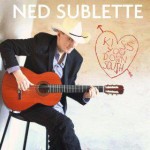We are all the heroes of our own imaginations. Likewise we can be our own tragic victims. The nature of art is to become this reality on the page (or recording) regardless of and indifferent to its real world (an endangered phrase) outcome.
Writers obsessed with fame, money and power are systematically denied that imaginative vision. They instead become artisans working in a marketplace creating consumer goods. Their product becomes inevitably and often fatally narcissistic. New Orleans has traditionally afforded artists the opportunity to pursue marketplace-free goals and continues to do so. This is what attracted the singular imagination of Ned Sublette to the city that lured Clemens and Whitman, Faulkner and Williams into its magic crescent.
[iframe src=”https://embed.spotify.com/?uri=spotify:album:0y8aieUTTYiHAFOzzT8Dd4″ width=”300″ height=”380″ frameborder=”0″ allowtransparency=”true” class=”spotify-right”]Buy on AmazonBuy on iTunes
Sublette is a fantasist of metaphysical dimensions. As part of the late 20th century downtown Manhattan arts scene, he led the world’s only country and western salsa band, a group almost calculated to alienate all but the most curious of listeners and which was singled out for disapprobation by the self-described schoolmaster (dean, in fact) of rock criticism, Robert Christgau.
Sublette has gone on blithely pursuing the goals of a 19th century American adventurist, traveling constantly as he’s worked at various trades from auctioneer to cultural historian. New Orleans became his Holy City, the place a Caribbean cowboy could call home.
I was fortunate enough to be in Piety Street Studios the night Sublette recorded the title track while enveloped in cavernous shadows of candlelight. The spirit of that moment, of a writer deeply engaged in the ritual of his art, imbues this numinous album of songs about and inspired by New Orleans. It’s Ned and his Spanish guitar talking about drinking, loving and carousing across the streets of history in his adopted city. With only that guitar and that imagination, he conjures a world of ghosts and generals, brass bands and Mardi Gras Indians. Most of all he tells you what it means to live between Piety and Desire (which would be Rosalie Alley, but that’s another story). All in all, a good place to be.





